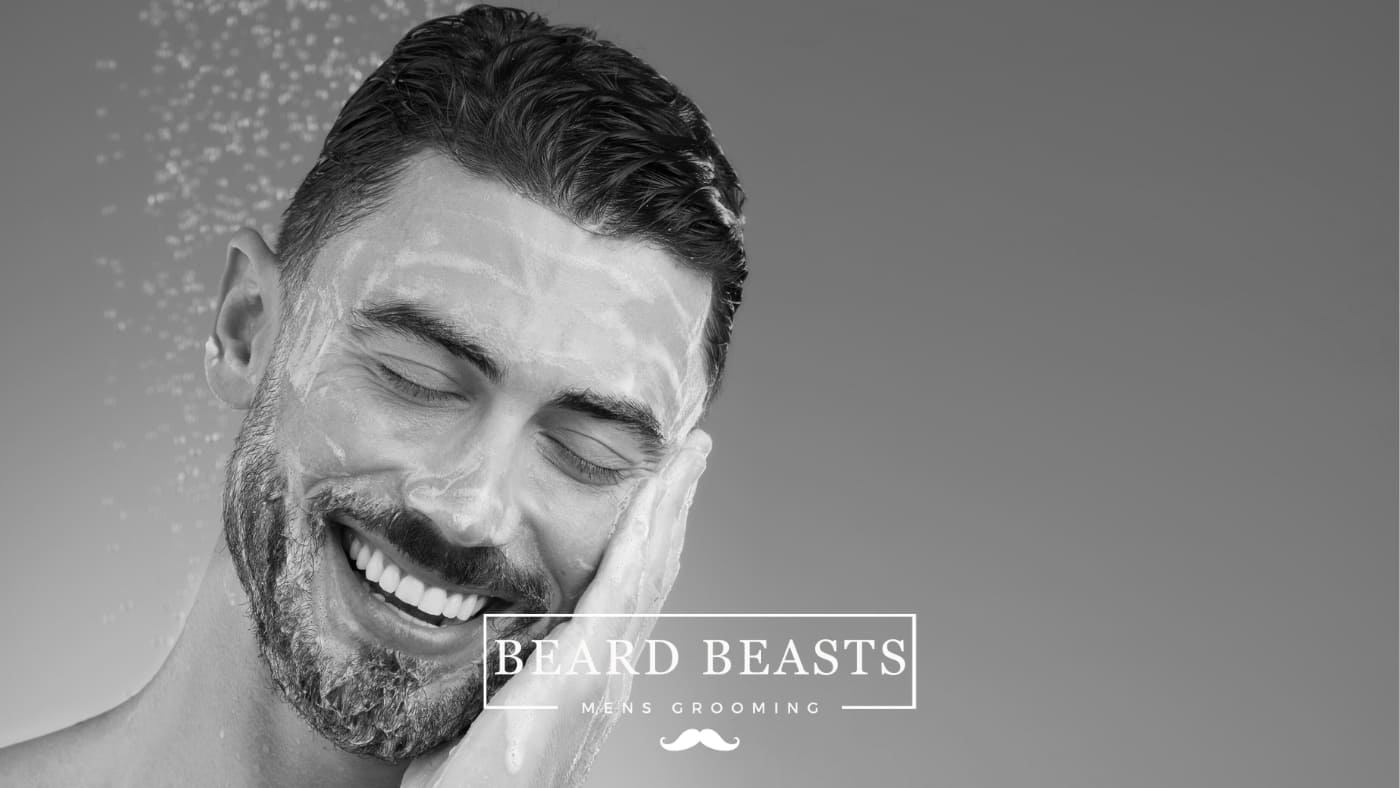How to Get Clear Skin for Men
Clear skin is a universal sign of health and well-being, but achieving it can often feel like a challenge, especially for men. Whether you're battling acne, dealing with sensitivity, or aiming to reduce the signs of aging, understanding how to get clear skin for men is crucial.
This article is designed to demystify the process, offering straightforward advice and practical steps that cater specifically to men's skin care needs. From identifying your skin type to adopting a tailored skincare routine, making lifestyle adjustments, and knowing when to seek professional help, we'll guide you through the essentials of achieving and maintaining clear skin.
Our goal is to provide you with valuable insights and actionable tips to help you look and feel your best. So, let's embark on this journey together, uncovering the keys to a clear, healthy complexion.
Understanding Your Skin Type
Learning how to get clear skin for men starts with understanding your unique skin type. This knowledge is crucial as it guides you in choosing the right products and routines. Let's dive into the characteristics of the four primary skin types: oily, dry, combination, and sensitive. By identifying which one you have, you can take a big step towards achieving that coveted clear skin.

Identifying Your Skin Type
-
Oily Skin: If your skin often looks shiny, and you notice a greasy feeling by midday, it's likely you have oily skin. This type is prone to acne and breakouts due to excess sebum production.
-
Dry Skin: Does your skin feel tight, especially after cleansing? Do you notice flaking or rough patches? These are signs of dry skin, which lacks moisture and can feel uncomfortable.
-
Combination Skin: Combination skin means having both oily and dry areas. Typically, the forehead, nose, and chin (the T-zone) are oily, while the cheeks remain dry.
-
Sensitive Skin: Sensitive skin tends to react to certain products with redness, itching, or breakouts. It requires gentle care and hypoallergenic products to avoid irritation.
The Impact of Skin Type on Your Skin Care Routine
Understanding your skin type is the first step towards clear skin. Here's how to tailor your routine:
-
For Oily Skin: Look for water-based, non-comedogenic products that won't clog pores. Regular exfoliation can help prevent buildup that leads to breakouts.
-
For Dry Skin: Hydration is key. Use rich moisturizers and gentle cleansers that don’t strip your skin of its natural oils.
-
For Combination Skin: You might need to use different products for different areas. Light, non-comedogenic moisturizers work well for the T-zone, while richer creams may be needed on the cheeks.
-
For Sensitive Skin: Avoid harsh ingredients and fragrances. Opt for simple, soothing products designed for sensitive skin types.
By identifying your skin type, you're taking a crucial step in figuring out how to get clear skin for men. Selecting the right products and routines tailored to your needs can make all the difference. Remember, skincare is highly personal; what works for others may not work for you.
Feel free to experiment carefully and consult a dermatologist if you're unsure about your skin type or the best care approach. Achieving clear skin is a journey that begins with understanding your skin's unique characteristics.
How to Get Clear Skin for Men: Essential Skin Care Steps
Achieving clear skin for men requires consistency and understanding the basics of skin care. Here’s how you can lay the foundation for a clear complexion with three key steps: daily cleansing, proper moisturizing, and diligent sun protection.
These essential skin care steps are foundational in learning how to get clear skin for men, guiding you towards a healthier, more vibrant complexion.
Daily Cleansing: The First Step to Clear Skin
Cleansing your face daily is a fundamental step in achieving clear skin, as it removes dirt, oil, and impurities that can clog pores and lead to breakouts. Selecting a cleanser tailored to your skin type is vital to ensure that you cleanse effectively without compromising your skin's natural oils.
For Oily Skin
Although gel-based cleansers are typically recommended for oily skin to remove excess oil without drying, there are exceptions that prove just as effective. For instance, the CeraVe Foaming Facial Cleanser, while not a gel, is designed for oily skin. It deeply cleanses to remove oil and dirt, providing a refreshing clean without over-stripping the skin.
For Dry Skin
For those with dry skin, cream or lotion cleansers are usually suggested to add moisture while cleansing. However, an alternative like the Nivea Men Maximum Hydration Moisturizing Face Wash, which contains Aloe Vera, is specifically formulated for dry skin. It hydrates and prevents the skin from drying out, despite not being a traditional cream or lotion.
For Combination Skin
A gentle foaming cleanser is ideal for balancing both oily and dry areas of combination skin. It's crucial to find a product that cleanses effectively without causing dryness or irritation.
For Sensitive Skin
Sensitive skin requires special attention to avoid irritation. Fragrance-free, mild cleansers are the go-to. The Neutrogena Ultra Gentle Hydrating Cleanser, for instance, is a non-foaming face wash that gently cleanses sensitive skin without causing undue stress, proving that effective cleansing doesn't need to be harsh.
Moisturizing Matters: Hydration for Every Skin Type
Moisturizing is essential for all skin types to maintain a healthy barrier and prevent dryness or oiliness. It's about finding the right balance that hydrates your skin without causing breakouts.
- For Oily Skin: Lightweight, oil-free moisturizers are perfect to hydrate without adding greasiness.
- For Dry Skin: Rich creams and hydrating ointments provide the moisture needed to combat dryness.
- For Combination Skin: You might need a lighter moisturizer for oily areas and a heavier one for dry spots.
- For Sensitive Skin: Soothing ingredients and hypoallergenic formulas are key to moisturizing without irritation.
Sun Protection: A Critical Step for Clear Skin
Sunscreen is non-negotiable in preventing skin damage and maintaining clear, healthy skin. It protects against premature aging and reduces the risk of skin cancer.
- Choosing Sunscreen: Look for broad-spectrum protection with at least SPF 30. Water-resistant formulas are great if you're active or sweat a lot.
- Applying Sunscreen: Apply generously on all exposed areas, not just your face, 15 minutes before going outside. Reapply every 2 hours or after swimming or sweating.
Achieving clear skin for men begins with mastering the essentials: cleansing, moisturizing, and sun protection. Selecting products tailored to your skin type and incorporating these steps into your daily regimen is crucial for how to get clear skin for men.
This routine lays the foundation for a healthier, clearer complexion. Consistency in your skincare practices plays a pivotal role, demonstrating that a bit of dedication can significantly impact your skin's appearance and health.
How to Get Clear Skin for Men: Advanced Skin Care Techniques
To elevate your journey on how to get clear skin for men, incorporating advanced skin care techniques can significantly enhance your routine. Here, we delve into exfoliation, acne management, and the benefits of serums and specialized treatments.
Exfoliation for Clear Skin: Chemical vs. Physical Exfoliants
Exfoliation removes dead skin cells that can clog pores and dull your complexion. There are two main types: chemical and physical exfoliants.
- Chemical Exfoliants: These use acids (like AHAs and BHAs) to gently dissolve dead skin cells. They're excellent for treating acne, reducing fine lines, and improving skin texture.
- Physical Exfoliants: These contain small particles or beads that physically scrub away dead skin cells. They're best used sparingly to avoid irritation.
How Often to Exfoliate
- For Oily and Combination Skin: Twice a week.
- For Dry or Sensitive Skin: Once a week, using gentle exfoliants.
Tackling Acne and Breakouts: Prevention and Treatment
Keeping acne at bay involves both preventive measures and targeted treatments.
- Preventive Measures: Regular cleansing, using non-comedogenic products, and keeping your hands away from your face.
- Treatments: Over-the-counter products containing salicylic acid or benzoyl peroxide can be effective. For persistent acne, consult a dermatologist for prescription options.
Effective Acne-Fighting Ingredients
- Salicylic Acid: Unclogs pores and reduces swelling and redness.
- Benzoyl Peroxide: Kills bacteria and helps clear pores.
- Retinoids: Promote cell turnover and prevent clogging of hair follicles.
The Role of Serums and Treatments: Targeted Solutions
Serums and treatments offer concentrated solutions to address specific skin concerns, from aging signs to hyperpigmentation.
Recommended Serums for Men
- Hyaluronic Acid: For hydration.
- Vitamin C: For brightening and reducing pigmentation.
- Niacinamide: For controlling oil and minimizing pores.
Advanced skin care techniques, including proper exfoliation, acne management, and the use of targeted serums and treatments, are crucial in mastering how to get clear skin for men.
By understanding and applying these methods, you're better equipped to tackle specific skin issues and enhance your skin's overall health and appearance. Remember, consistency and choosing the right products for your skin type are key to seeing results.
Lifestyle Changes for Healthier Skin
Diet and Skin Health: Eat Right for a Radiant Complexion
What you eat affects your skin. For clear skin, include foods rich in antioxidants, vitamins, and minerals. Embrace fruits, vegetables, lean proteins, and whole grains. Omega-3 fatty acids found in fish can also reduce inflammation and improve skin health. On the flip side, try to limit sugar, dairy, and processed foods, as they can trigger breakouts in some people.
Hydration and Your Skin: The Essence of Clear Skin
Drinking plenty of water is crucial for maintaining clear skin. Water helps to flush out toxins and keeps your skin hydrated and plump. Aim for at least 8 glasses a day, and incorporate hydrating foods like cucumbers and watermelon into your diet.
Exercise and Skin Clarity: Active Body, Clear Skin
Regular exercise boosts circulation, which helps to nourish skin cells and keep them vital. Sweat also helps to clear pores, reducing the risk of acne. Just remember to cleanse your face after a workout to remove any sweat and bacteria.
Stress Management Techniques: Keep Calm for Clear Skin
Stress can wreak havoc on your skin, leading to breakouts and other issues. Incorporate stress-reduction techniques such as meditation, yoga, or deep-breathing exercises into your daily routine to help manage stress levels and promote clearer skin.
Quality Sleep: Rest Your Way to Radiant Skin
Never underestimate the power of a good night's sleep. Sleep allows your skin to repair and regenerate. Aim for 7-9 hours of quality sleep each night to reduce stress hormones, which can exacerbate skin conditions, and to ensure your skin looks its best.
Adopting healthy lifestyle habits plays a vital role in achieving how to get clear skin for men. A balanced diet, adequate hydration, regular exercise, effective stress management, and quality sleep are all integral to supporting your skin care routine and ensuring your skin remains clear and healthy. Remember, taking care of your skin is not just about what you put on it, but also about taking care of your overall health.
Shaving Tips for Clear Skin
Shaving is a daily ritual for many men, but without the right techniques, it can lead to irritation, redness, and ingrown hairs, hindering your journey to clear skin. Follow these shaving tips designed to protect your skin and enhance your complexion.
Pre-Shave Preparation: Protecting Your Skin
Before you even pick up a razor, prepare your skin to minimize damage and irritation. Start by washing your face with warm water and a gentle cleanser to remove dirt and excess oil. Applying a pre-shave oil can also help by creating a protective barrier between your skin and the razor, reducing the risk of cuts and irritation.
Shaving Techniques: Reducing Irritation and Preventing Ingrown Hairs
Choosing the right razor and using proper shaving techniques are crucial for preventing skin issues. Here's how:
-
Use a Sharp Razor: A dull blade can tug at the hair and irritate the skin. Always use a sharp, clean razor.
-
Shave with the Grain: Shave in the direction of hair growth to minimize irritation and the risk of ingrown beard hairs.
-
Don't Over-Shave: Going over the same area multiple times can irritate the skin. Try to make each stroke count.
-
Rinse the Blade Often: This keeps the razor effective and reduces the chance of dragging trapped dirt and oil across your face.
Post-Shave Care: Soothing and Hydrating the Skin
After shaving, it's important to soothe and hydrate your skin:
-
Rinse with Cool Water: This helps to close the pores and calm the skin.
-
Apply an After-Shave Balm: Look for products that are hydrating and free from alcohol, as alcohol can dry out your skin. A good balm can soothe and moisturize the skin, reducing post-shave irritation.
-
Moisturize: Even if you've used an after-shave balm, applying a moisturizer is key to keeping your skin hydrated and healthy.
For men striving for clear skin, mastering the art of shaving is essential. Preparing your skin before shaving, employing the right techniques during, and caring for your skin afterward can dramatically reduce irritation and promote a healthier, clearer complexion.
Remember, how to get clear skin for men isn't just about the products you apply—it's also about the daily rituals that contribute to your skin's overall health.
Additional Tips on How to Get Clear Skin for Men
Achieving clear skin involves more than just a solid skincare routine; it also requires mindful habits. Here are some additional tips that can help you maintain clear skin:
Avoid Touching Your Skin
Your hands come into contact with millions of bacteria daily, which can transfer to your face each time you touch it. This can lead to breakouts and skin irritation. Make a conscious effort to keep your hands away from your face to help maintain clear skin.
Reduce Smoking and Alcohol Consumption
Smoking and excessive alcohol consumption can significantly impact your skin's health. Smoking reduces blood flow to the skin, leading to a dull complexion and promoting the development of wrinkles. Alcohol dehydrates the body and skin, which can make your skin look older and more tired. Cutting back on these habits can improve skin clarity and overall health.
Reduce Sugar Intake
High sugar intake can lead to spikes in insulin levels, which may exacerbate skin conditions like acne. By reducing your sugar intake, you can help regulate your body's insulin levels and improve your skin's appearance.
Reduce Dairy Products
Some studies suggest that dairy products, especially skim milk, may be linked to acne. While the connection isn't fully understood, it's believed that hormones present in milk may play a role in acne development. Consider reducing your dairy intake to see if it makes a difference in your skin condition.
Incorporating these additional habits into your lifestyle can further enhance your journey on how to get clear skin for men. By avoiding touching your face, reducing smoking and alcohol consumption, cutting down on sugar, and limiting dairy products, you can help prevent breakouts and maintain a clearer complexion.
When to See a Dermatologist
While a good skincare routine and healthy lifestyle habits are crucial for maintaining clear skin, sometimes they might not be enough. Knowing when to seek professional help can be a game-changer in your quest for clear skin. Here's a guide on recognizing the signs that it's time to see a dermatologist and an overview of the treatments they may offer.
Signs You Need Professional Help
-
Persistent Acne: If your acne refuses to clear up despite using over-the-counter products, it might be time to consult a dermatologist. Persistent or severe acne can lead to scarring, making professional intervention important.
-
Skin Irritation or Allergic Reactions: When products cause more harm than good, leaving you with irritation, redness, or allergic reactions, a dermatologist can help identify the root cause and suggest alternatives.
-
Unusual Moles or Skin Growths: Any changes in moles or unexplained skin growths should be evaluated by a professional to rule out serious conditions like skin cancer.
-
Severe Skin Conditions: Conditions like psoriasis, eczema, or rosacea require professional treatment plans tailored to your specific needs.
Professional Treatments for Clear Skin
Dermatologists offer a range of treatments that can significantly improve your skin's appearance:
-
Topical Medications: Prescription-strength creams and gels to target acne, hyperpigmentation, and other skin concerns.
-
Oral Medications: Antibiotics, isotretinoin (for severe acne), or other oral treatments to address skin issues from the inside out.
-
Chemical Peels: Removes the top layer of skin to reduce scars, hyperpigmentation, and signs of aging, revealing smoother, clearer skin beneath.
-
Laser Therapy: Targets various skin issues, including acne scars, age spots, and fine lines, with precise laser treatments.
-
Microneedling: Encourages the skin to produce more collagen, improving texture and appearance.





